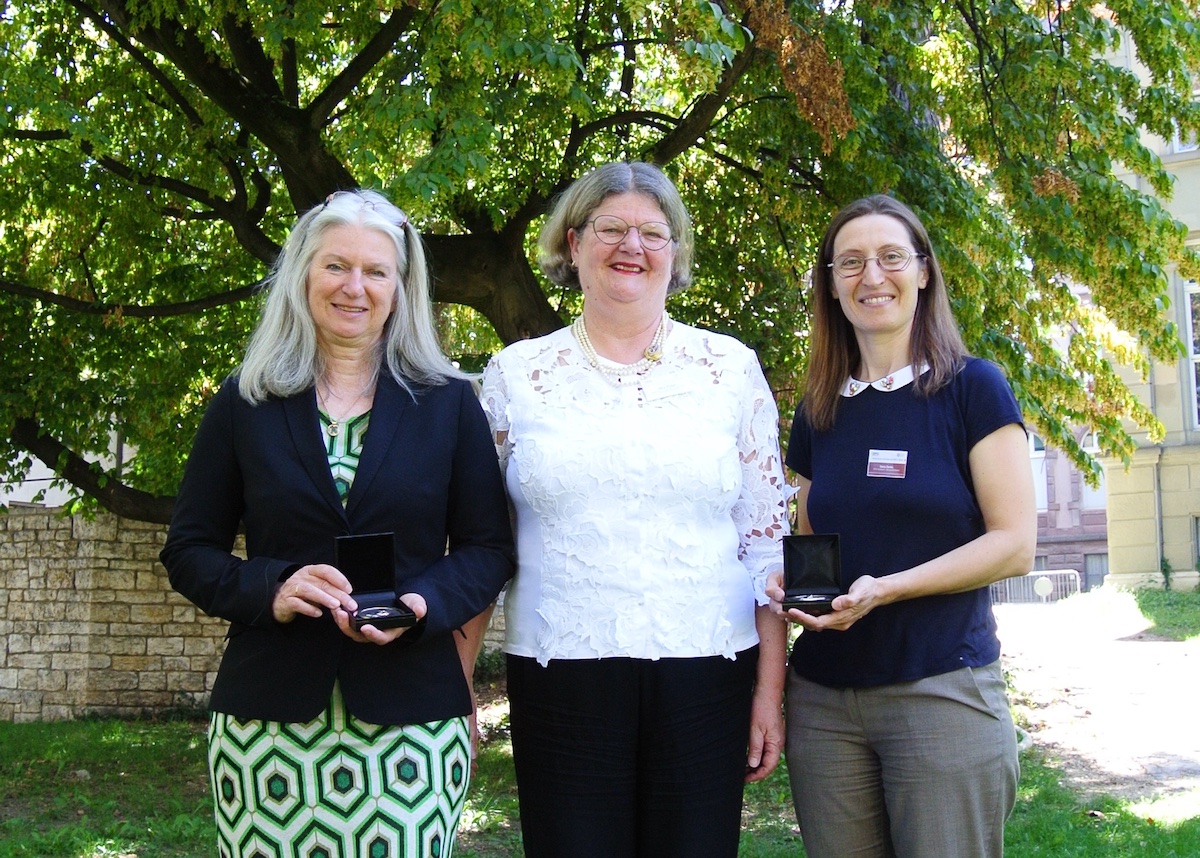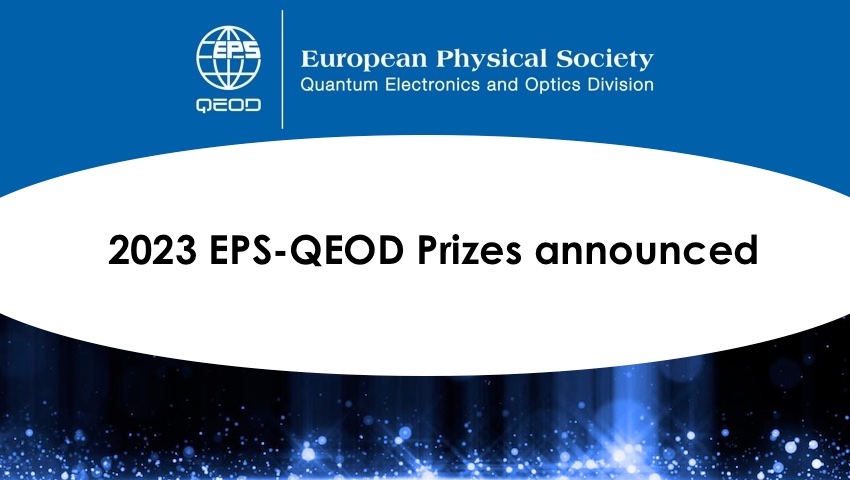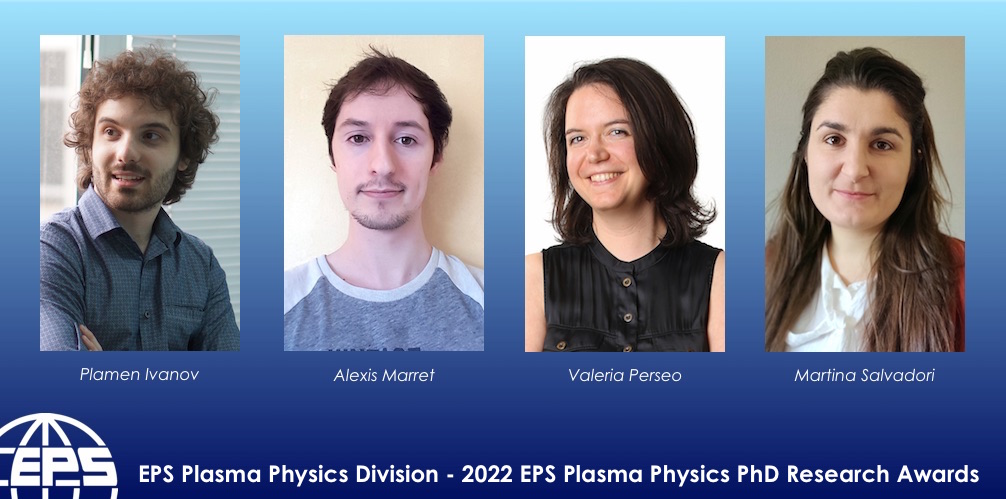|
|
Posted By Administration,
Friday 14 June 2024
Updated: Friday 14 June 2024
|

FLTR: Monika Ritsche-Martke, Petra Rudolf and Ilaria Zardo - image credit: Gina Gunaratnam
Petra Rudolf, chair of the EPS Equal Opportunities Committee,
and Gina Gunaratnam, EPS communication coordinator, interviewed Ilaria
Zardo [IZ], from the Department of Physics, University of Basel (CH),
and Monika Ritsch-Marte [MRM], from the of the Institute of Biomedical
Physics, Dept. of Physiology & Medical Physics, Medical University
of Innsbruck (AT). They are laureates of the EPS Emmy Noether
Distinction 2022.
Why did you choose physics?
IZ:
I was interested in Greek, Latin and Philosophy. When I told my parents
I wanted to study physics, it was a big surprise. Especially to my
father who wondered why I had studied all these subjects to "end up"
with sports (in Italian "physics" and "sports" is the same word).
MRM:
I wanted to find a position in relation to Nature. I come from an
academic family, so they encouraged me. But outside, I didn't get
positive reactions. After having attended the Open Days in Innsbruck, I knew
that I wanted to get a master's degree in sciences.
What is the most rewarding aspect of your career and what difficulties did you encounter?
MRM:
It is nice to have recognition from the community but the most
rewarding is when I do active research, when I get results and I
understand things from Nature.
In the 80s', women had to face
difficult times. There were aggressive attitudes. My younger brother
and my husband are also scientists and they were offered positions while
I didn't get one.
IZ: The most rewarding is when I first finish a
project. When I realise that I found something. When I have gone
through all the paths to get where I want to go and I reach it, this is a
rewarding moment. It is also beautiful to see the same way of
thinking/development in people you work with.
Difficulties: We are
trained to be scientists but not to deal with people. You have a strong
contact with your colleagues. You need trust and faith. This is very
challenging.
Recommendations to encourage diversity
IZ:
I am extremely happy to have a very diverse group: different countries,
different backgrounds. I was motivated by a colleague who told me that
you gain much more from someone who is different from you, who will have
another approach to a problem.
MRM: Quotas are important to get
women involved [in research groups] and I don't care about being called
"Quotenfrau" ("quota woman" in German). It shouldn't be the aim but is a
necessary measure to have more women. If they can do the job, they
should be given the chance.
Career and family
MRM:
I married a colleague! So there was competition between us. It is
difficult to get everything you want once you have a family. I consider
it a "fermionic principle ": either you choose the field of research you
are interested or the place where you want to live. You cannot have the
two at the same time. My advice: be determined but flexible. And ask
yourself the following: What is something I cannot live without?
In my case, I changed fields: from theoretical physics, I switched to medical physics.
IZ:
"I am not a hero!" I have three children and my husband is also a
physicist working in industry. I would advise to not pay attention
to judgement. When asked about children, you can answer that your
husband is never asked about them.
More info
Tags:
award
diversity
EPS Emmy Noether Distinction
EPS EOC
EPS Equal Opportunities Committee
interview
medical physics
nanoscience
women in physics
Permalink
|
|
|
Posted By Administration,
Friday 14 June 2024
Updated: Friday 14 June 2024
|
Nominations are sought for the Fritz London Memorial Prize for Low
Temperature Physics, which will be presented at the International Low
Temperature Conference (LT30) in Bilbao, Spain, in August 2025.
The
Fritz London Memorial Prize is an international prize supported by the
endowment created at Duke University by John Bardeen, a generous gift
from the late Horst Meyer, and donations from Oxford Instruments. It is
awarded once every three years and is intended to recognize outstanding
experimental and theoretical contributions to low temperature physics.
Background information and a list of previous London Prize winners can
be found at: https://physics.duke.edu/fritz-london-memorial-prize
The
members of the 2025 London Memorial Prize Committee are: P. Hakonen
(Chair, Aalto U., Finland), Eva Andrei (Rutgers U., USA), Laura Greene
(FSU and MagLab, USA), H. Mooij (TU Delft, Netherlands), and Y. Okuda
(Tokyo Institute of Technology, Japan).
Nominations and supporting letters should be sent to the Chair of the Prize Committee:
Prof. Pertti Hakonen
pertti.hakonen@aalto.fi
Subject: London Memorial Prize
The deadline for the receipt of nominations and supporting letters is November 15, 2024.
The nomination letter should clearly state all of the following:
- The basis for the proposed prize.
- Publications on which the nomination is based.
- An assessment of the impact on the low temperature community.
- Relevant biographical information and institutional affiliation.
- Supporting letters (no more than 4) should be submitted together with the nomination materials.
There
are no restrictions on who could receive this award. It has been the
policy of the committee to avoid giving the award for work that has
already been recognized by the Simon Memorial Prize or by other
comparable awards. The committee also looks more favorably on recent
work as compared to work whose significance has been apparent for a long
time.
Tags:
award
call
conferences
Fritz London
Fritz London Memorial Prize
low temperature
prize
Permalink
|
|
|
Posted By Administration,
Friday 30 June 2023
|

The Quantum Electronics and Optics Division (QEOD) of the European
Physical Society is happy to announce its 2021 and 2023 prizes. The following prizes are attributed:
- EPS-QEOD Quantum Electronics Prize
Miles Padgett, Vahid Sandoghdar and Giulio Cerullo
- EPS-QEOD Fresnel Prizes
Xiaochun Gong and Zuo Chao
- EPS-QEOD Thesis Prizes
Andrea Schirato, Shima Rajabali, Gur Lubin and Sebastian Ecker
Download the complete announcement with all prizes and biographies of the winners here.
The prizes were awarded at CLEO®/Europe-EQEC 2023 on Tuesday 27th June
2023 in Munich, Germany.
More info

Images by Stefan Heigl - more on the CLEO©Europe/EQEC website



Tags:
award
EPS QEOD
EPS Quantum Electronics and Optics Division
EPS-QEOD Fresnel prize
EPS-QEOD Quantum Electronics prize
EPS-QEOD Thesis prize
prize
Permalink
|
|
|
Posted By Administration,
Monday 20 June 2022
Updated: Monday 20 June 2022
|
Authors: French Physical Society, Swiss Physical Society
The Charpak-Ritz Prize 2022 awarded to Laura Baudis, for her leadership in international astro-particle physics
collaborations, outreach activities and seminal contributions to dark
matter research.

Laura Baudis is awarded with the 2022 Charpak Ritz Price jointly given by the French Physical Society and the Swiss Physical Society.
She has provided significant contributions to an increasingly burning
question in astrophysics and cosmology: What holds cosmological
structures together and controls the formation and evolution of
galaxies, including our own Milky Way? It remains an enigma that the
abundance of all known forms of matter is too low to explain the level
of gravitational interaction observed in galaxies, clusters of galaxies
and at the largest scales in the universe. This has triggered the
hypothesis of ‘dark matter’, which is undetectable by electromagnetic
interactions. The dark matter, which accounts for 85% of all matter in
the universe, could be made of new elementary particles, such as Weakly
Interacting Massive Particles (WIMPs). The search for WIMPs has been a
main pillar of Laura Baudis’ career.
For more than a decade,
experiments using two-phase (liquid and gas) xenon time projection
chambers (TPCs) have yielded the world’s best sensitivity in the direct
detection of WIMPs. Laura Baudis, who is a professor at University of
Zürich, has played a leading role in the development of large xenon
detectors with ultra-low backgrounds at their core. These are part of
the collaborative XENON programme, which started with XENON10, recently
operated XENON1T and currently acquires data with XENONnT. XENON1T
reached the lowest background ever observed in a dark matter detector
and observed the very rare two-neutrino double electron capture process
in xenon-124, an outstanding result in nuclear physics. XENON1T is
currently world-leading in providing the strongest constraints on WIMP
interactions over a broad mass range. To improve the statistical
sensitivity even further towards a possible detection of dark matter, an
upscaled experiment XENONnT was prepared and started in 2021. Apart
from her leading contributions to the TPCs, including the photosensor
arrays to observe the xenon scintillation light in the VUV region, Laura
Baudis has been assuming key roles in the collaboration: as
co-spokesperson, chair of the collaboration board and recently as chair
of the science strategy team. Towards the next generation effort DARWIN,
which she also co-founded, Laura Baudis has developed crucial
experimental setups and prototypes to selectively detect rare photon and
electron emission events in a large volume of liquid xenon as a
characteristic WIMP signature. It is also important to note that within
these larger multi-national research projects a significant part of
Laura Baudis’ work has been performed in collaboration with French
researchers at LPNHE in Paris and the SUBATECH laboratory in Nantes.
Next
to her complex multi-lateral scientific efforts, Laura Baudis has also
been actively involved in outreach activities, giving a TED talk and she
features in two documentary movies about Science and Scientists
(“Chasing Einstein”, “Eros und Atome” – in German).
Tags:
award
Charpak-Ritz Prize
SFP
SPS
Permalink
|
|
|
Posted By Administration,
Tuesday 12 April 2022
Updated: Tuesday 12 April 2022
|
The 2022 EPS Plasma Physics PhD Research Awards go to:
- Plamen Ivanov
(University of Oxford, UK) for his thesis on “Zonally dominated dynamics
and the transition to strong turbulence in ion-scale plasma
turbulence”,
- Alexis Marret (Sorbonne
University & Observatoire de Paris-PSL, France) for his thesis on
“The non-resonant streaming instability: from theory to experiment”,
- Valeria Perseo
(University of Greifswald, Germany) for her thesis on “Impurity flow
measurements with Coherence Imaging Spectroscopy at Wendelstein 7-X”,
- Martina Salvadori
(University of Rome “La Sapienza”, Italy) for her thesis on “Advanced
time-of-flight diagnostics for real-time characterization of ions
accelerated by high energy lasers”.
Read more about the prizes of the EPS Plasma Physics Division: http://plasma.ciemat.es/eps/awards/

Tags:
award
EPS Plasma Physics Division
EPS PPD
EPS PPD PhD Research Awards
thesis
Permalink
|
|
|
Posted By Administration,
Thursday 17 February 2022
|
The 2021 EPS Hannes Alfvén Prize is awarded to Prof. Sergei Igorevich Krasheninnikov. The 2022 EPS Hannes Alfvén Prize is awarded to Prof. Xavier Garbet.
Read the complete announce on the website of the EPS Plasma Division.
Tags:
2021
2022
award
EPS PPD
Hannes Alfvén Prize
Plasma Physics
Permalink
|
|
|
Posted By Administration,
Monday 17 January 2022
|
Nominations are now open for the EPS Early Career Prize. The EPS has two Early Career prizes to be awarded each year – one each for achievements of a mainly theoretical or experimental nature. Those eligible for these awards should have made a substantial contribution to the development or reputation of physics in Europe. "Early Career" is defined as those individuals in the first 12 years of their career in physics following their first degree or equivalent, with allowance for any career breaks.
More information on what is needed to make a nomination can be found here.
The deadline to submit a nomination is 15th February 2022.

Tags:
2022
award
EPS Early Career Prizes
EPS prizes
young physicists
Permalink
|
|
|
Posted By Administration,
Tuesday 16 November 2021
|

The Ampère house and museum in Poleymieux near Lyon, France. Photo: Christian Barberon/Wikimedia Commons
Author: Alfonso San Miguel
Wednesday, October 6 2021, the Ampère Museum was inaugurated as an
EPS Historic Site. This is the fifth site in France and it is
dedicated to André-Marie Ampère.
The Ampère family home, where
André-Marie spent his childhood and studied brilliantly with his father,
had an exceptional destiny. The state of Poleymieux-au-Mont-d'Or
(Rhône) where it is located, about fifteen kilometers from Lyon, was
sequestered for the benefit of the Nation in 1793, when the French
Revolution condemned the future scientist's father to death. Restored to
the family two years later, it fell to Ampère in 1812, after the death
of his mother. He relinquished it ten years later when he settled
permanently in Paris.
André-Marie Ampère spent a very large part
of his childhood and youth in this house, soon after his birth in 1775
until he was 29 years old. Without attending school, he read Diderot’s
Encyclopedia and learned to scrutinize Nature and to understand the
mathematics, physics and chemistry of his time. It was during this
period that emerged his first ideas about the relationship between
electricity and magnetism. Few years later, in 1820 he established the
first mathematical relationships between these two physical phenomena.
By giving the name of Ampère to the international unit of electrical
current, the whole world saluted his fundamental discoveries, which gave
rise to electrodynamics.
It took a century for the Poleymieux
estate to regain the memory of its prestigious former owner. It was on
the advice of Paul Janet, a member of the French Academy of Sciences,
that two wealthy American industrialists, Hernand and Sosthène Behn,
bought the estate in 1928. They donated the estate to the French Society
of Electricians (SEE), which entrusted it to the Society of the Friends
of André-Marie Ampère (SAAMA), an association created to manage and
develop a Museum of Electricity and to perpetuate the memory of the
illustrious Lyon native. The Museum of Electricity was inaugurated on
1st July 1931.
The EPS Historic Site ceremony, which was part of
the "Ampère 200 ans" (Ampère 200 years) programme of commemorations for
the bicentenary of André-Marie Ampère's discoveries in electrodynamics,
was sponsored by Serge Haroche, 2012 Nobel Prize in Physics. In the
morning, Serge Haroche gave a lecture at the University of Sciences of
Lyon to more than 400 participants on the history of light. He
highlighted the importance of André-Marie Ampère's discoveries in the
unification of electricity, magnetism and optics. At the end of the day,
the ceremony continued at the Ampère Museum where the commemorative
plaque was unveiled by Serge Haroche and Luc Bergé in front of a hundred
people, representatives of the academic world of Lyon, the electricity
industry and learned societies. The ceremony was conducted together by
François Gerin, president of the SEE, who also read a message from
Gérard Mourou, 2018 Nobel Prize in Physics and sponsor of “Ampère 200
ans”, and by the President of the Society of the Friends of André-Marie
Ampère, Alfonso San Miguel, who nominated the site.

FLTR: Guy Wormser (SFP), François Gerin (SEE), Serge
Haroche, Luc Bergé (EPS), Gabriel Fioni (representative of the French
Ministry of Higher Education and Research),
Corinne Cardona (major of
Poleymieux) and Alfonso San Miguel (SAAMA and SFP) - Photo: Alfonso San Miguel
Tags:
Ampère
award
electrodynamics
EPS Historic Site
France
Nobel Prize
Serge Haroche
Permalink
|
|
|
Posted By Administration,
Thursday 15 April 2021
Updated: Thursday 15 April 2021
|
Authors: French Physical Society & Swiss Physical Society
The French Physical Society and the Swiss Physical Society are proud to announce the 2021 winner of the Charpak-Ritz Prize:
Marie-Emmanuelle Couprie

image credit: Philippe Berteaud
Marie-Emmanuelle Couprie, researcher at the 2.75 GeV electron
synchrotron SOLEIL, located south of Paris, has received this award for her
outstanding contributions "in light sources using particle
accelerators to emit synchrotron radiation of high spectral purity and
high degrees of longitudinal and transverse coherence".
Dr.
Couprie is the head of the Magnetism and Insertion Device group at
SOLEIL and she is in charge of piloting the Free Electron Laser
activities. She is an expert of Free Electron Laser theory and
applications, she has an outstanding track record of referred
publications, and she is strongly involved in the development of
technologies with industries.
The Swiss Physical Society congratulates Marie-Emmanuelle Couprie warmly on this prestigious award. [More: spf-website, sps-website].
Marie-Emmanuelle
Couprie will receive the Charpak-Ritz medal on 1 September 2021 in the
award ceremony of the annual meeting, jointly organised by the Swiss and
Austrian physical societies, 31 August to 3 September 2021 in
Innsbruck, Austria, where she will also present her work in a plenary
talk to the participants of the conference.
Tags:
award
Charpak-Ritz prize
French Physical Society
prize
SFP
SPS
Swiss Physical Society
Permalink
|
|
|
Posted By Administration,
Tuesday 13 April 2021
|
Prof. Sergey I. Bozhevolnyi, University of Southern Denmark, Odense, Denmark has been elected the winner of the 2020 EPS-QEOD Prize for Research in Laser Science and Applications for his “seminal contributions to surface-plasmon polaritons and the developments of plasmonic metasurfaces”.
More information on the website of the EPS QEOD.
Tags:
award
EPS QEOD
EPS Quantum Electronics and Optics Division
laser
Research in Laser Science and Applications Prize
Permalink
|
|
|
|